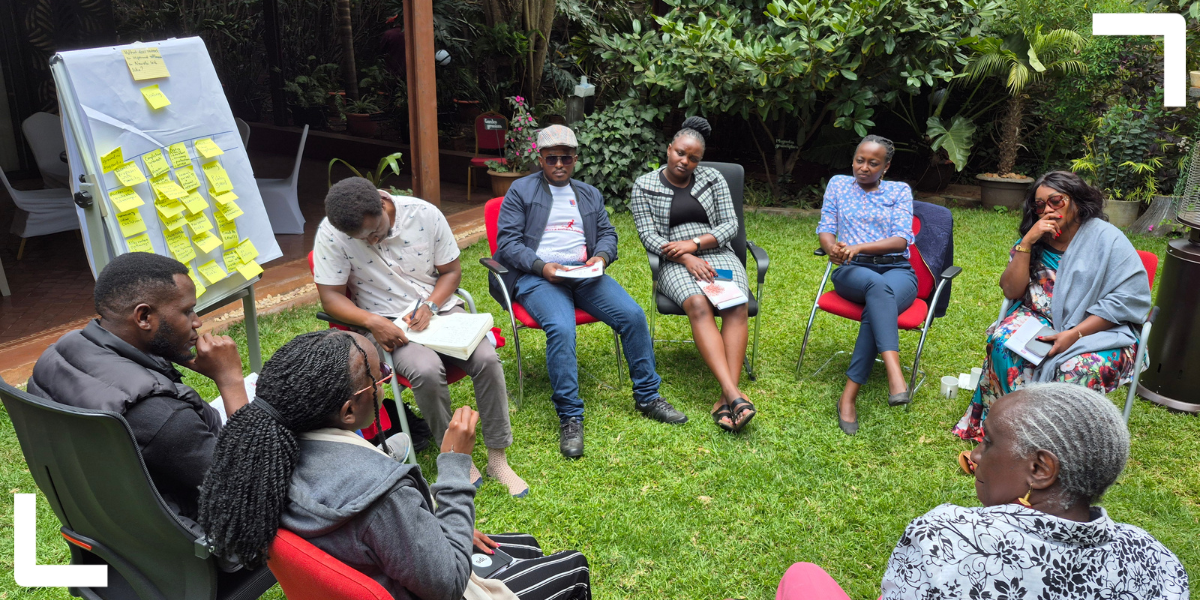By Evans Otibine, Kelvin Mbatia, Maureen Musya, Michelle Koyaro, Veronica Mwangi, Susan Mwanzia, Patrick Njoroge, Jane Weru, Jack Makau and Amollo Ambole
What does research in informal settlements in Nairobi look like?
This was the guiding question for a recent learning writeshop that brought together action research (AR) teams working across Nairobi’s informal settlements. The teams are exploring urgent urban challenges – from water and sanitation to school feeding, waste management, and land rights – under the African Cities Research Consortium (ACRC).
The writeshop was a space to pause, reflect, compare notes and celebrate how each team is turning complexity into opportunities for innovation and reform. What emerged is a story of research that is adaptive, deeply rooted in context and always seeking new ways to create transformative urban futures.
Setting the stage: Action research in Nairobi
Nairobi is a city of contrasts. It’s a powerhouse of trade and innovation in the East and Central African sub-region, yet also a place where inadequate services, fragmented planning and exclusionary systems weigh most heavily on residents of densely populated locales in the informal settlements.
ACRC is working in Nairobi to capitalise on these contrasts and create opportunities for reform. Building on in-depth research about the city’s systems and political dynamics, ACRC is supporting local partners in designing and implementing action research projects that directly address pressing challenges. Each initiative is co-produced with community members and stakeholders, creating practical pathways toward more inclusive and equitable urban futures.
The AR projects focus on four critical areas:
> Improving water and sanitation in Mukuru informal settlement, led by Akiba Mashinani Trust (AMT).
> Extending school feeding programmes to informal schools, led by LVCT Health.
> Establishing a holistic waste management system in Mathare informal settlement, led by Slum Dwellers International (SDI).
> Empowering communities with land ownership data in Mathare informal settlement, led by Strathmore University in partnership with AMT.
These AR projects were selected because they addressed complex social problems and offered genuine opportunities to drive change. Each project has been innovative from the outset, yet even with a robust design process, all have encountered unexpected challenges along the way. Rather than stalling progress though, these challenges have prompted teams to adapt and strengthen their approaches, in some cases achieving greater impact than originally anticipated. A key strength has been the dual focus on both project monitoring, which tracks the efficiency of implementation, and project learning, which captures effectiveness and broader lessons for future reform.
Together, these initiatives embody the spirit of ACRC’s approach: using action research to experiment and co-create solutions that can influence city-wide reform.
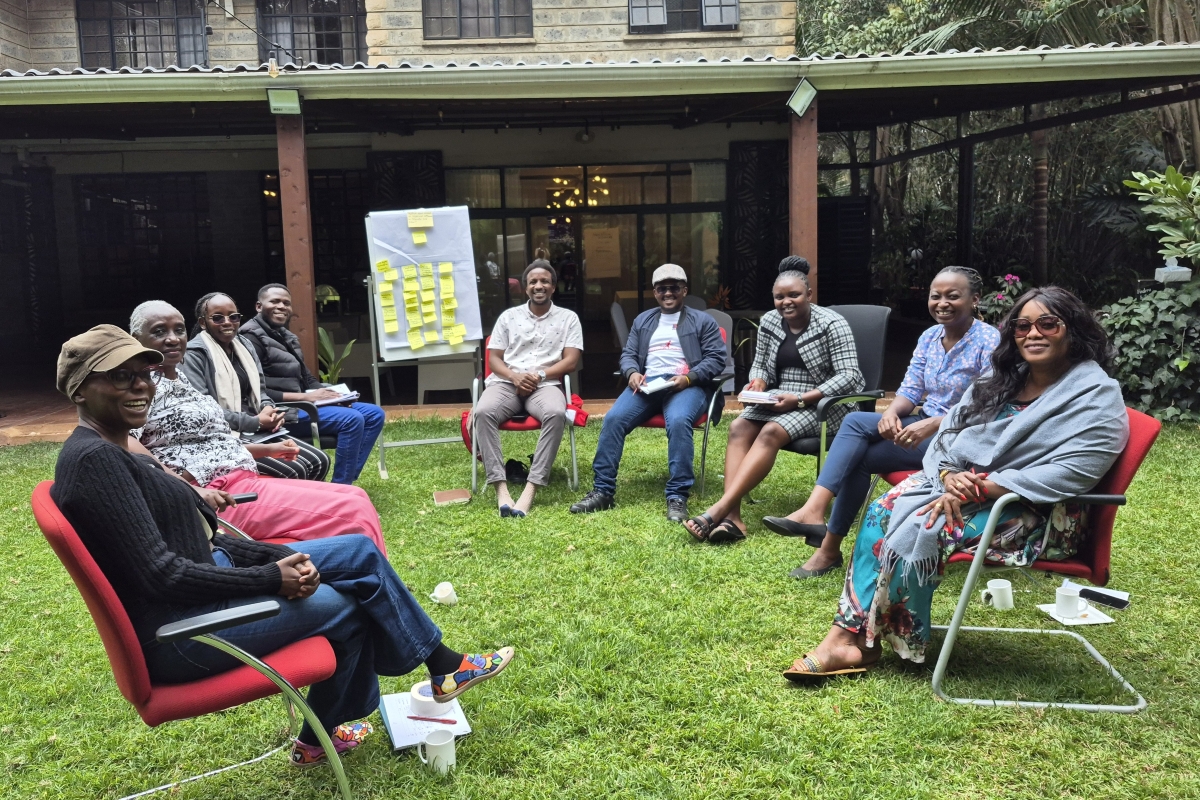
Embracing reality as a pathway to innovation
“Vitu kwa ground ni tofauti” (things on the ground are different). For the AR researchers, these differences have opened up new avenues for learning and redesigning interventions.
In Mukuru, the first phase of sewer line installation faced hurdles, including non-compliance. Enforcement efforts were difficult without institutional backing, as some structure owners refused to connect to the sewer infrastructure even though tenants were keen to access the improved services. This experience created the opportunity for AMT, which is leading this initiative, to involve the County Public Health Department from the very beginning in the expansion phase. This early engagement legitimised the process and helped secure stronger compliance from structure owners, paving the way for better long-term public health outcomes for all.
In the school feeding programme, the lead agency, LVCT Health, anticipated engaging with children as primary beneficiaries of the programme. Despite having ethical clearance, the LVCT action research team was unable to obtain permission from the Ministry of Education, which restricted access to children’s voices. While this initially felt like a barrier, it opened up new opportunities to engage parents in a more comprehensive way. Their views on nutrition and household realities have influenced programme outcomes in significant and unexpected ways.
In Mathare, the 2024 floods and government-ordered demolitions of houses in riparian zones reshaped the settlement landscape overnight. Planned interventions suddenly risked being misaligned with residents’ immediate needs. This disruption created space for SDI – leading the waste management action research team – to work more closely with Mathare’s active youth groups and align with the Nairobi Rivers Commission’s broader resilience agenda, ensuring the project continues to be relevant to evolving priorities.
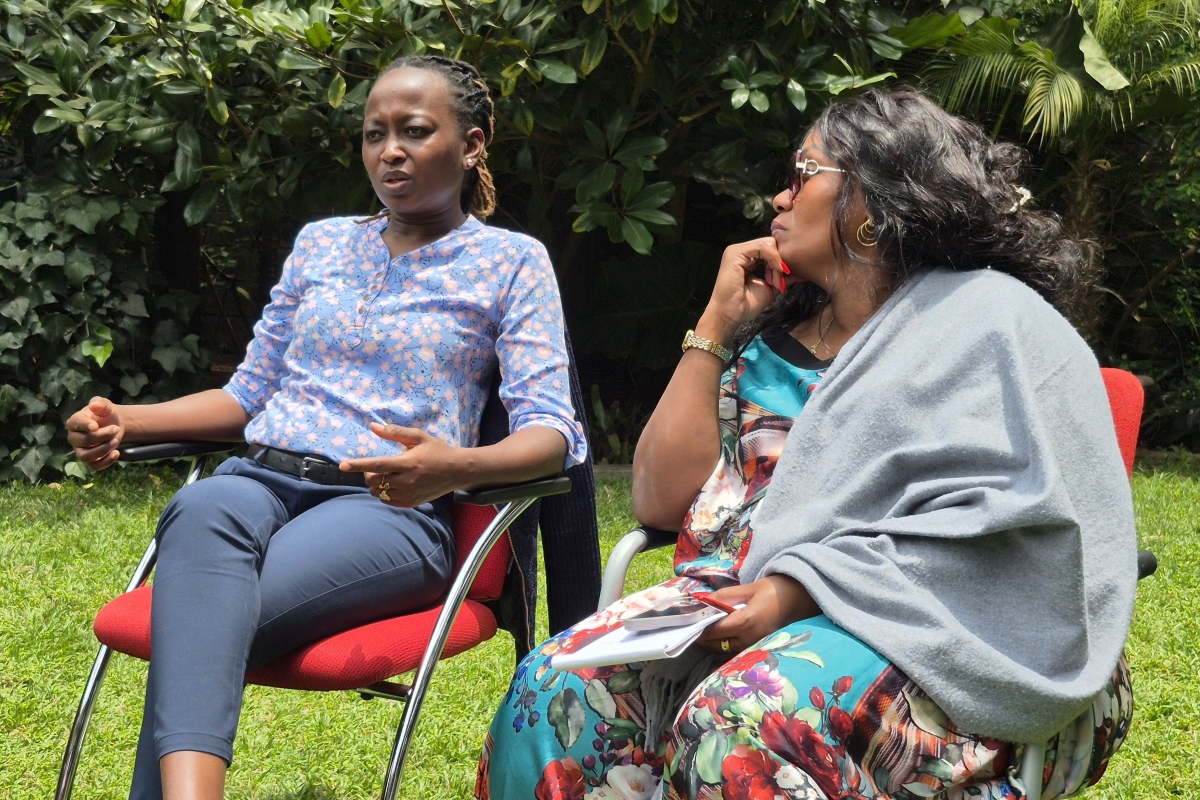
In the land rights project, initial efforts to collect comprehensive building profiles across Mathare faced hostility and mistrust, particularly in villages affected by government housing projects and demolitions. Residents feared the data could be misused, and some villages became inaccessible. By scaling back and focusing on areas where residents were ready to engage, the action research team from Strathmore University and AMT built stronger relationships and trust. This adjustment safeguarded the project and laid a more sustainable foundation for future collaboration.
Far from being barriers, these realities have become entry points for adaptation and innovation.
Harnessing power dynamics for constructive change
Nairobi’s informal settlements are fraught with layered interests and overlapping authorities, from local politicians and administrators to informal service providers, landlords, structure owners and village elders. Rather than creating a deadlock, these dynamics have opened valuable opportunities for the AR teams to refine strategies and build new alliances. Each project has demonstrated that navigating power is about identifying champions and fostering shared ownership of solutions.
In Mukuru, the water and sanitation project encountered informal vendors, local administrators and politicians – all with a stake in service delivery. While vendors initially sought to protect their businesses, negotiations revealed ways to integrate them into more inclusive service models. Administrators and elected leaders became allies in aligning community priorities with official mandates.
In the school feeding programme, researchers found that headteachers emerged as unexpected champions. Their ability to persuade parents and boards of management was pivotal in winning support for the feeding interventions. By stepping into this leadership role, educators helped bridge the gap between government policies and the everyday needs of children, showing how trusted local actors can transform programmes.
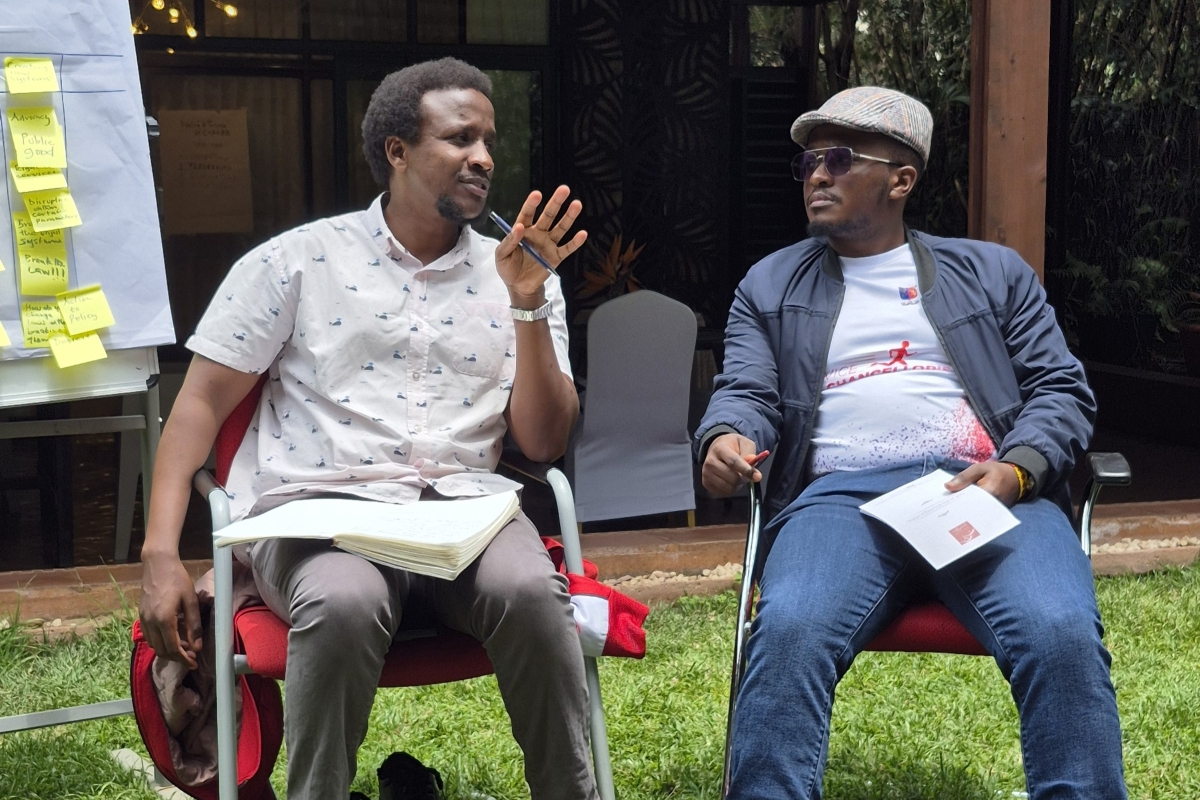
In Mathare, questions about who controls and benefits from public spaces surfaced during the waste management research. Instead of fuelling conflict, these debates sparked a participatory mapping process that brought together youth, women’s groups, elders and service providers. The process clarified competing claims and strengthened local ownership of interventions, turning contested space into a platform for collaboration.
In the land rights work, the interplay between tenants, structure owners, landowners, elders and state institutions highlighted the complexity of land governance in informal settlements. By engaging with each layer of authority, the research team opened multiple avenues for dialogue. This inclusive approach is laying the groundwork for advocacy that acknowledges diverse interests while promoting greater tenure security for residents.
Together, these experiences underscored a key lesson: in Nairobi’s informal settlements, power is rarely fixed. When continually mapped and constructively engaged, shifting dynamics can become powerful drivers of reform.
Rethinking data as a shared resource
Across the AR projects, questions of consent, data ownership and data use have encouraged researchers to experiment with new ways of building trust and accountability.
In the school feeding programme, parents raised concerns about who benefits from the information collected and whether findings would be shared back with the community. This prompted the establishment of stronger feedback loops, ensuring that data collection is not a one-way process but one that reinforces community ownership.
In Mathare’s waste management work, residents worried that information on settlement conditions might be used to justify evictions. Rather than shutting down the research, this concern sparked deeper conversations about transparency, accountability and the safeguards necessary to protect vulnerable groups.
In the land rights research, data challenges were especially pronounced. Collecting information on land ownership and structure proprietorship in Mathare touched on highly sensitive issues, as many structure owners feared the data could be misused. Accessing titling records from the Lands Ministry proved to be the greatest hurdle, constrained by both legal requirements and the risk of exposure. The national Ardhisasa land data system requires prior consent from landowners before parcel details can be retrieved. In Mathare, where ownership is highly contested, such consent could not be obtained. Moreover, informal settlements have historically been targets of irregular land transfers, many of which have led to ongoing legal disputes. For these reasons, the Lands office was unlikely to release titling details at the scale of Mathare, where more than 400 parcels are in question.
Despite these obstacles, the AR team leveraged academic credentials and built strong relationships to gain access to some titling data, while also cultivating interest from the Lands office in participating in the project. To fill remaining gaps, the team reverted to the older postal land search system and combined it with careful community engagement to reconstruct ownership patterns. They are now experimenting with anonymisation and storytelling tools that safeguard privacy while still amplifying the realities of tenure insecurity.
In each case, data became a platform for dialogue, trust-building and collective responsibility. By reframing data as a community asset rather than just a research output, these projects are laying the foundation for more ethical and accountable research practices in Nairobi’s informal settlements.
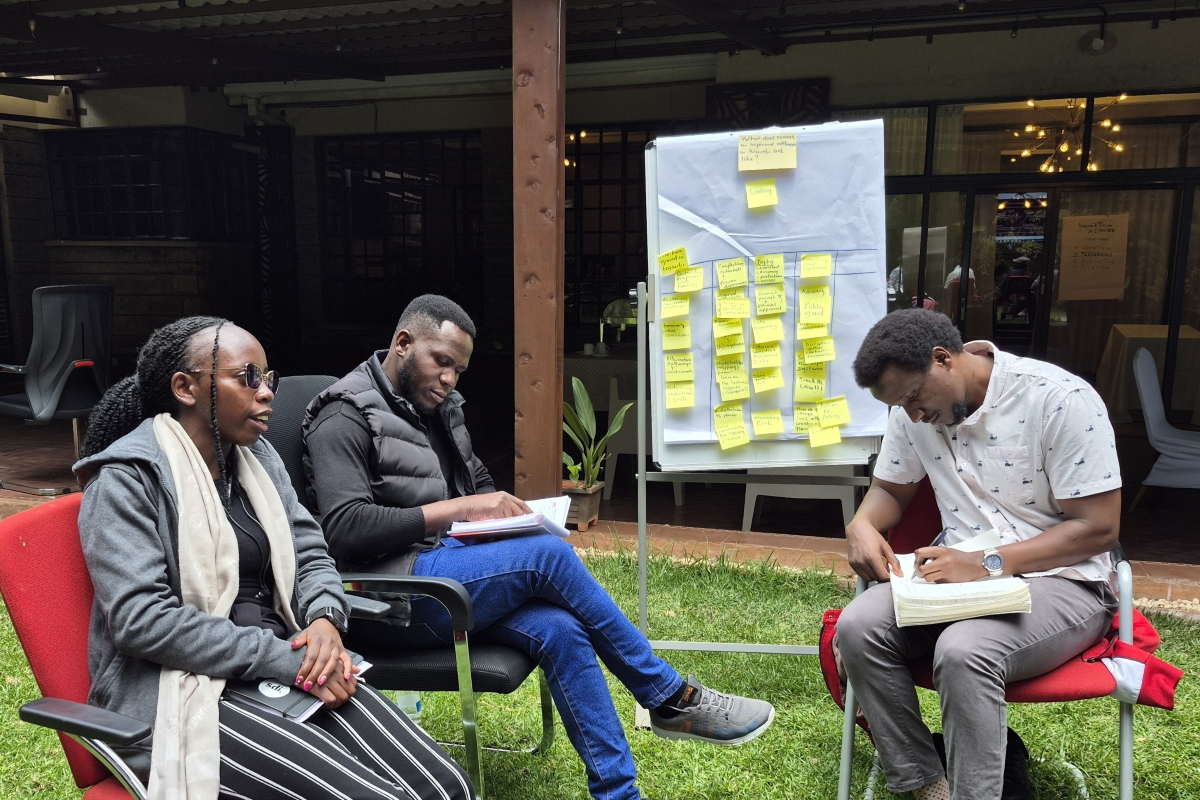
Building new systems from the ground up
Experimentation across the projects is pointing toward fresh models that are already shaping practice and policy.
In Mukuru, dismantling exploitative water and sanitation cartels and transitioning to utility-managed systems is improving both governance and public health, not just in Mukuru, but for the entire city of Nairobi. This shift was not accidental. For years, Mukuru residents paid a “poverty penalty” – buying water at up to 800% higher prices than those in wealthier neighbourhoods. By documenting these inequities and linking them to frequent cholera outbreaks in the city, researchers and community advocates reframed the issue as a public health emergency that affected the entire city. Their advocacy helped persuade county and national leaders to act, culminating in the declaration of Mukuru as a Special Planning Area.
New infrastructure, combined with community mobilisation and technical planning, created the momentum to replace cartel-controlled services with utility-managed systems. The AR team is carrying these decade-long lessons into Nairobi’s draft Water and Sanitation Policy, which will extend the benefits of co-created models to other informal settlements across the city. Mukuru thus illustrates that systemic reform is a process and never a single act. It requires years of technical groundwork, consistent community organising and strategic framing to convince decision-makers that reform is in everyone’s interest.
In school feeding, the pilots in informal schools are demonstrating affordable models that can complement and expand on the County government’s Dishi Na County school feeding programme. By engaging parents and headteachers directly, this AR initiative is showing that community-driven models can inform broader policy and ensure that no child is left behind.
In Mathare, the waste management team is proving that community-led service delivery can be effective. Participatory mapping of public spaces and sanitation needs is creating inclusive approaches that challenge the exclusionary logic of urban service delivery, while also providing evidence for adaptation planning in the face of climate shocks.
In the land rights work, new tools for documenting informal tenure are opening doors to more equitable land governance. By navigating the requirements of the conventional land data system and strengthening local trust, the project is demonstrating that sensitive data can be transformed into a powerful tool for advocacy without exposing communities to harm.
Each of these innovations shows how small-scale experiments, when linked to evidence, mobilisation, and advocacy, can open pathways to systemic change.
Mapping progress
So, what does research in Nairobi’s informal settlements look like? It looks like adaptation turned into innovation. It looks like power relations harnessed for progress. It looks like sensitive data reframed as a community asset. And it looks like small pilots sparking wider reform.
Above all, it looks like a collaborative journey – one where researchers, communities and policymakers walk together to find opportunities in challenges and pathways to justice in places too often overlooked.
For ACRC, the Nairobi writeshop affirmed that research is about co-creating hope, equity and new possibilities for African cities.
Photo credits: Amollo Ambole
Note: This article presents the views of the authors featured and does not necessarily represent the views of the African Cities Research Consortium as a whole.
The African Cities blog is licensed under Creative Commons Attribution-NonCommercial-NoDerivatives 4.0 International (CC BY-NC-ND 4.0), which means you are welcome to repost this content as long as you provide full credit and a link to this original post.

